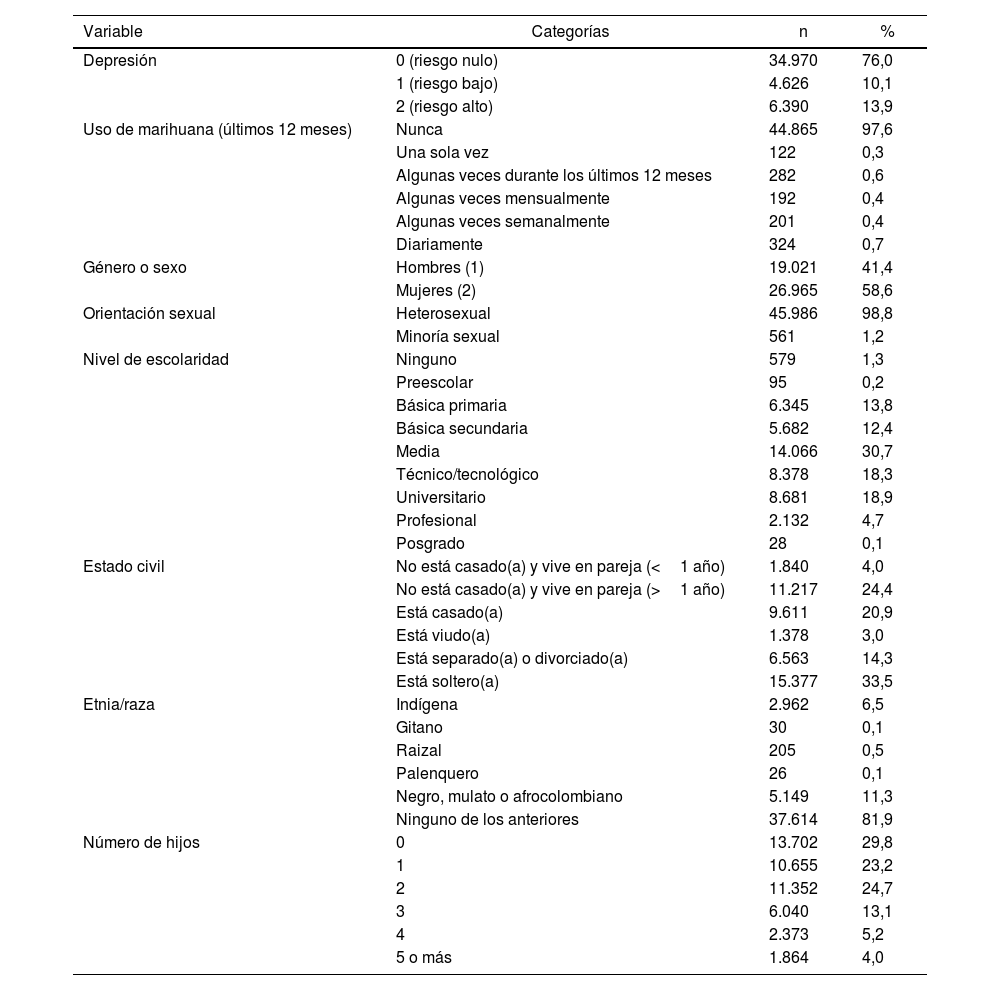Se ha observado una asociación entre consumo de cannabis y síntomas depresivos. Sin embargo, esta relación necesita corroborarse en una muestra probabilística de adultos colombianos y evaluar el papel moderador del género y la orientación sexual.
ObjetivoEstablecer la relación entre consumo de cannabis y depresión y el papel moderador del género y la orientación sexual en adultos de la población general colombiana.
MétodoSe llevó un análisis secundario de la Encuesta Nacional de Consumo de Sustancias Psicoactivas, ENCSPA-2019. Mediante un análisis de moderación (regresión logística lineal) se cuantificó el papel moderador del género (sexo) y la orientación sexual en la relación entre consumo de cannabis y depresión.
ResultadosParticiparon 45.986 adultos entre 18 y 65 años (39,8±13,8); el 58,6% fueron mujeres, un 13,9% estaba en riesgo alto de depresión, un 1,2% informó orientación sexual diversa y un 1,6% fumó cannabis durante el mes más reciente. El consumo de cannabis se asoció a depresión (β=0,04; p<0,05), después de ajustar por edad, etnia, nivel educativo, estado civil y número de hijos. La población sexualmente diversa muestra un mayor riesgo de consumo de cannabis que la población heterosexual (β=0,41; p<0,05). La orientación sexual moderó la relación entre consumo de cannabis y depresión (β=0,16; t=2,06; p<0,05) y el género (β=−0,05; t=−5,26; p<0,05).
ConclusionesLa asociación del consumo de cannabis con la depresión está mediada por el género y la orientación sexual. Se requieren más estudios en población colombiana adulta para indagar otras variables relacionadas con la identidad sexual.
An association was observed between cannabis smoking and depressive symptoms. However, this relationship must be corroborated in a probabilistic sample of Colombian adults, and the moderating role of gender and sexual orientation must be evaluated.
ObjectiveTo establish the relationship between cannabis use and depression and the moderating role of gender and sexual orientation in adults from the general Colombian population.
MethodA secondary analysis of the National Survey on the Consumption of Psychoactive Substances, ENCSPA-2019 was conducted. The moderating role of gender (sex) and sexual orientation in the relationship between cannabis use and depression was quantified using a moderation analysis (linear logistic regression).
Results45,986 adults between 18 and 65 years old (39.8±13.8) participated, 58.6% were women, 13.9% were at high risk of depression, 1.2% reported diverse sexual orientation, and 1.6% smoked cannabis during the most recent month. Cannabis smoking was associated with depression (β=0.04, p<0.05) after adjusting for age, ethnicity, educational level, marital status, and number of children. The sexually diverse population shows a higher risk of cannabis use than the heterosexual population (β=0.41, p<0.05). Sexual orientation moderated the relationship between cannabis smoking and depression (β=0.16, t=2.06, p<0.05) and gender (β=−0.05, t=−5.26, p<0.05).
ConclusionsThe association of cannabis use with depression is mediated by gender and sexual orientation. More studies are required in the adult Colombian population to investigate other variables related to sexual identity.








